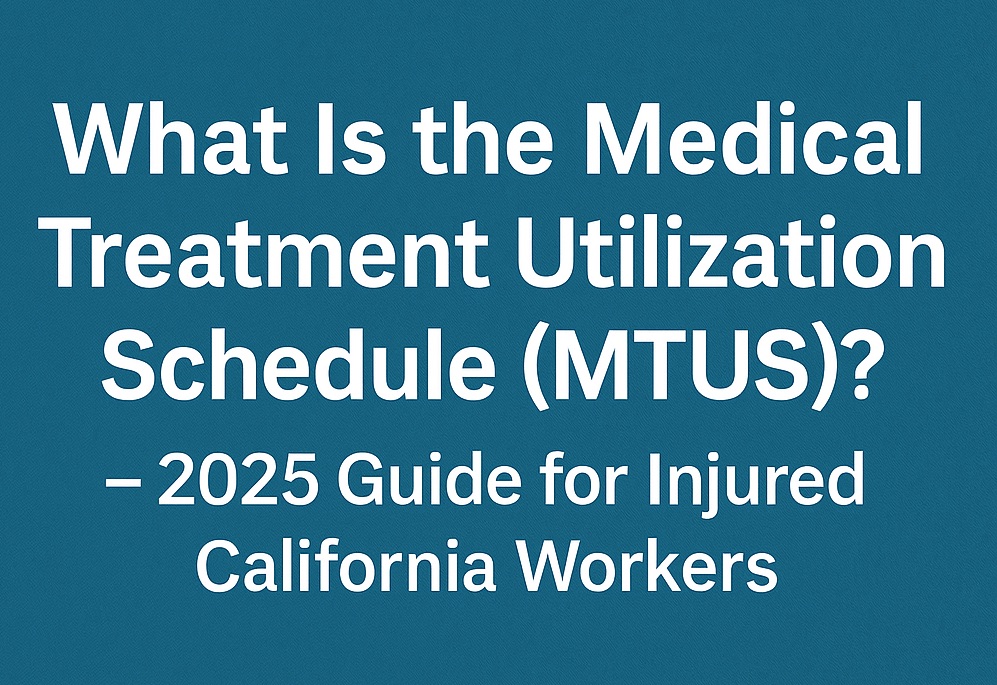
Introduction: Why MTUS Matters
If you’ve been injured at work in California, you’ve likely heard the term MTUS used in connection with your medical care. But what is it—and why does it matter?
The Medical Treatment Utilization Schedule (MTUS) is the official set of guidelines that governs medical treatment in California workers’ compensation cases. It determines what care is considered “reasonable and necessary,” how long treatment should last, and what must be authorized by insurance.
At Employees First Labor Law (EFLL), we help injured workers understand and enforce their rights under the MTUS, especially when treatment is denied, delayed, or challenged.
What Exactly Is the MTUS?
The MTUS is a set of evidence-based medical guidelines adopted by the California Division of Workers’ Compensation (DWC) under Labor Code § 5307.27. It was created to standardize treatment, reduce disputes, and ensure that injured workers receive medically appropriate care.
The MTUS is presumed correct on the extent and scope of treatment for a given injury. That means claims administrators, utilization review (UR) physicians, and Independent Medical Review (IMR) reviewers all use MTUS to decide whether to approve or deny medical care.
What Does the MTUS Include?
As of 2025, the MTUS contains guidelines on:
- Initial and continuing care for common work injuries (back, neck, knee, shoulder, etc.)
- Chronic pain management
- Postoperative treatment
- Psychiatric and psychological care
- Medication guidelines, including opioids and non-opioid options
- Durable medical equipment (e.g., braces, wheelchairs)
- Functional restoration programs
- Alternative care (e.g., acupuncture, chiropractic)
- Cannabis guidance (as of 2025, it is not recommended)
These guidelines are regularly updated and are based primarily on the American College of Occupational and Environmental Medicine (ACOEM) standards, as well as other reputable sources.
Why the MTUS Is Legally Important
Under California law, any treatment request by your treating doctor must go through Utilization Review (UR). The UR reviewer applies the MTUS to decide whether the care is:
- Medically necessary
- Appropriate for the type and duration of the injury
- Supported by clinical evidence
If UR denies or modifies your doctor’s request, you can appeal through Independent Medical Review (IMR). The IMR reviewer is also bound by the MTUS. If your treatment request isn’t consistent with MTUS, it’s likely to be denied—even if your doctor believes it’s necessary.
This is why it’s crucial to have a legal team—like EFLL—working with doctors who understand how to write treatment requests that comply with MTUS.
Common Reasons Treatment Gets Denied Under MTUS
- Requesting treatment not supported by MTUS (e.g., excessive physical therapy, outdated surgeries, unapproved meds)
- Using cannabis, which is now explicitly not recommended under MTUS (as of Jan. 2025)
- Incomplete medical documentation—no proof of improvement or functional goals
- Opioid requests without proper weaning plans or behavioral health evaluations
- Requests for long-term “passive” treatments like massage or ultrasound without progress
Frequently Asked Questions
Q: Can I get treatment that’s not listed in the MTUS?
A: Yes, but your doctor must submit scientific evidence proving the care is medically necessary. This is called a “rebuttal” to MTUS, and it must follow strict rules. It’s difficult—but not impossible.
Q: What if my doctor disagrees with MTUS?
A: Your doctor can attempt to rebut the MTUS through peer-reviewed journal articles or alternative guidelines, but success is rare without legal help.
Q: What if the UR/IMR denial is wrong?
A: EFLL can appeal denials, request second opinions, or push for a change in primary treating physician if your care is being mishandled.
Q: Who decides what version of MTUS applies?
A: The DWC publishes the most current version of the MTUS and announces updates—such as the 2025 inclusion of the new Chronic Pain and Cannabis Guidelines.
EFLL’s Tips for Navigating MTUS
- Work with MTUS-Savvy Doctors
Your provider must know how to write Requests for Authorization (RFAs) that cite the correct MTUS language and timeframes. - Avoid Unsupported Treatments
Avoid relying on care that MTUS explicitly discourages, like cannabis or long-term opioid use. - Document Progress
Functional improvement must be tracked and documented for treatment to be continued under MTUS. - Use IMR Strategically
Not every denial should be appealed—but many are worth challenging. We’ll help decide when and how. - Know When to Fight Back
Some employers or insurance carriers exploit MTUS rules to delay or deny needed care. EFLL ensures that your rights and medical needs are respected.
Real Example: MTUS in Action
Case: Our client suffered a severe lumbar strain and was prescribed physical therapy beyond the MTUS limit of 12 visits.
Problem: UR denied the extension.
Solution: EFLL worked with the treating physician to provide documentation of functional improvement and filed an IMR with supporting evidence.
Outcome: The IMR overturned the UR denial and approved additional sessions. The client avoided surgery and returned to work.

Conclusion
The MTUS can either protect your treatment rights—or be used to deny them. Understanding how it works is key to receiving the medical care you deserve after a work injury.
At Employees First Labor Law, we guide injured workers through the entire treatment process—from doctor selection to UR appeals—ensuring that MTUS works for you, not against you.



